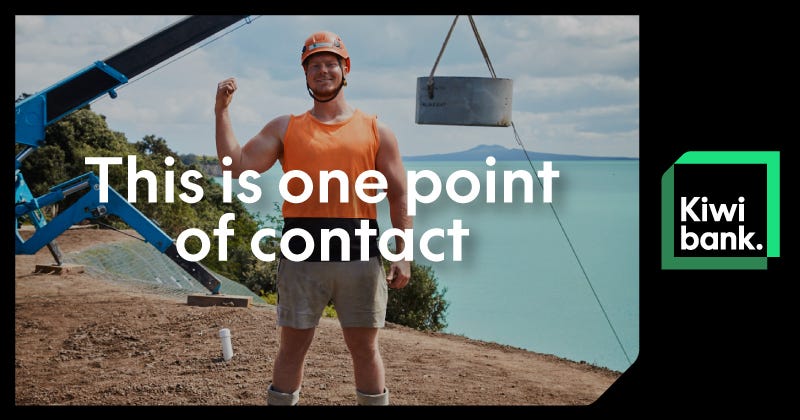The new online art business that isn’t trying to sell you an NFT
One local startup is helping Aotearoa artists reach a new kind of audience.
Mōrena and welcome to Stocktake, created in partnership with Kiwibank.
Oat milk is on everyone’s minds at the moment, from cafe coffees to Whittaker’s making chocolate out of it. All Good is sending its oat milk to Korea, and Boring Oat Milk has quickly become the local champion. No wonder it’s so hard to find a carton of the stuff at the supermarket. When I wrote about what seemed like a shortage, I was surprised to find there isn’t one – oat milk’s moving so fast stores can’t keep their shelves full. My story prompted many responses, including a DIY oat milk recipe. I tried it, and it’s good! Get in touch if you’d like it. If you can’t find it on the shelf, it might be the only way you can get your fix. This week: Forget NFTs, real-life art is making a comeback.
-Chris Schulz, business editor
‘If something moves you … you just have to trust that’
Stop, says Jessica Agoston Cleary. Pause for a moment. Does the image in front of you stir something? “You see it with your eyes and your heart,” says the owner of Artfull, a new online business connecting local artists with potential customers. “If something moves you, grabs your attention, you just have to trust that.”
What if you don’t know anything about art? Do you need an art history degree to truly understand a painting or a photograph? “Oh God no,” she says, “it’s about a feeling. If you like it, that’s all that matters.”
Agoston Cleary is hoping to help stir these feelings in visitors to her new website. Launched in June alongside co-founder and veteran TV producer John Barnett, Artfull offers an online gallery experience. Everyone from first-time buyers to collectors, emerging artists to those with established careers, are welcome. Without a rigid show schedule, Agoston Cleary says artists are freed from the shackles of having to produce multiple works for a dedicated gallery exhibition that often only lasts a few weeks. Instead, they can produce and sell one-off pieces whenever they’re ready. “They love it,” she says. “The art is available 365 days and 24/7 to anyone who wants to discover it.”
For buyers, there are AR tools to project art into a 3D representation of their homes. Plus there are lengthy notes about what the artist was trying to convey while making their piece, including video interviews. Giving artists space to discuss their work is rare, says Agoston Cleary. Often, their work is instead interpreted by gallery staff. “They don’t generally get to speak about their work in a public forum,” she says. “It’s them talking about it. That doesn’t happen often.”
Artfull has launched at a timely moment. NFTs, non-fungible tokens that give owners the rights to digital art files, surged in value in 2021 but have recently plunged. Meanwhile, prices for real-life art continue their ascent. Over the weekend, the Bank of New Zealand sold up to 50 pieces, including works by Rita Angus, Gordon Walters, and Ralph Hotere, fetching a combined $3.7 million. Many went for double their estimated price.
Agoston Cleary is, perhaps predictably, an NFT art skeptic. “Why are people spending millions on what is essentially a pile of 0s and 1s to store in your digital wallet?” she says. “What are you going to do with that? You can’t put it on your wall.”
Instead , she wants Artfull to build a supportive community around the artists whose work features on her website. Many, she says, did it tough during lockdowns. Some felt creatively stifled by stay-at-home orders, while others saw gallery shows – often their main source of income – postponed or cancelled. “There’s very much an expectation that art is there to lift us up build up a society and a culture,” she says. “It takes a toll to have that burden of propping people up [have] very little recognition and support.”
But there’s another trend Agoston Cleary is hoping Artfull taps into: the working-from-home era. It’s here to stay, and after several years of staring at the same four walls, many are looking to upgrade their spaces, from adding new furniture to spa pools or upgrading their kitchens. She believes art has an important role to play in making a home an inviting, liveable space.
“Art expresses so much more than we can say in words,” she says. “I’ve got a couple of pieces on my wall that I’ve had for years. Every morning I get up [and] it’s this big beautiful bunch of flowers that greets me when I’m bleary-eyed. It’s that kind of thing that makes owning art worthwhile.”
Business banking made simple, with Kiwibank
Kiwibank wants to help your business to soar, just like it has with thousands of other business banking customers. Kiwibank’s business banking experts can also manage your everyday banking, so you have one point of contact for both – saving you time and making your life easier. Find out more about how you can simplify your banking with Kiwibank.
The Tasman Mako want you
The Tasman Rugby Union is attempting to do something that could have far-reaching consequences and may even influence the next moves by the All Blacks. They’ve formed an exclusive membership club, and for small donations fans can receive apparel and personalised content, while their money goes towards developing the game. Will it work? Reweti Kohere investigates.
The lockdown-fuelled mushroom boom
Cafes are turning them into lattes, and people at home sprinkle teaspoons of the stuff into their morning tea. Meanwhile, one Raglan company can’t keep up with grow-your-own kits. What is happening with mushrooms right now? For this story, I traced down the business owners who started during Covid lockdowns and are now experiencing a full-on ‘shroom boom.
Who ‘owns’ the car parks?
The battle for walkable cities that prioritise cyclists and pedestrians over cars has only just begun. Waka Kotahi is a key player in deciding how this battle plays out. In the latest episode of his podcast When the Facts Change, Bernard Hickey talks to Waka Kotahi's urban mobile manager Kathryn King to find out how mode shift might be allowed, or made to happen.
A handful of quick links…
A founding member of reggae band Three Houses Down is in jail for nearly $2 million in tax evasion, reports the NZ Herald. He siphoned the money from his company Pomee Engineering Services by not paying Inland Revenue (IRD) for employees' deductions for income tax, KiwiSaver and student loans
Overseas acceptance of remote work is seeing Aotearoa-based tech staff being recruited for big money that local companies can’t match, reports Stuff.
The founder of clothing empire Patagonia is donating the entire worth of his company to help fight climate change. That’s a whopping $3 billion, or $100 million a year, depending on how the company is doing.
Seaweed is just the slimy stuff rudely interrupting your summer swims but when you dive a bit deeper, it is an inventive solution to many agricultural and horticultural issues. Business is Boring host Simon Pound talks to Agrisea about the potential of seaweed.
Finally, if you’re looking for a bonkers documentary to watch, Skandal! Bringing Down Wirecard follows the real-life case of an Ozark-style German tech company taken down by a dogged Financial Times journalist.
If you liked what you read today, share Stocktake with friends, family and colleagues.












